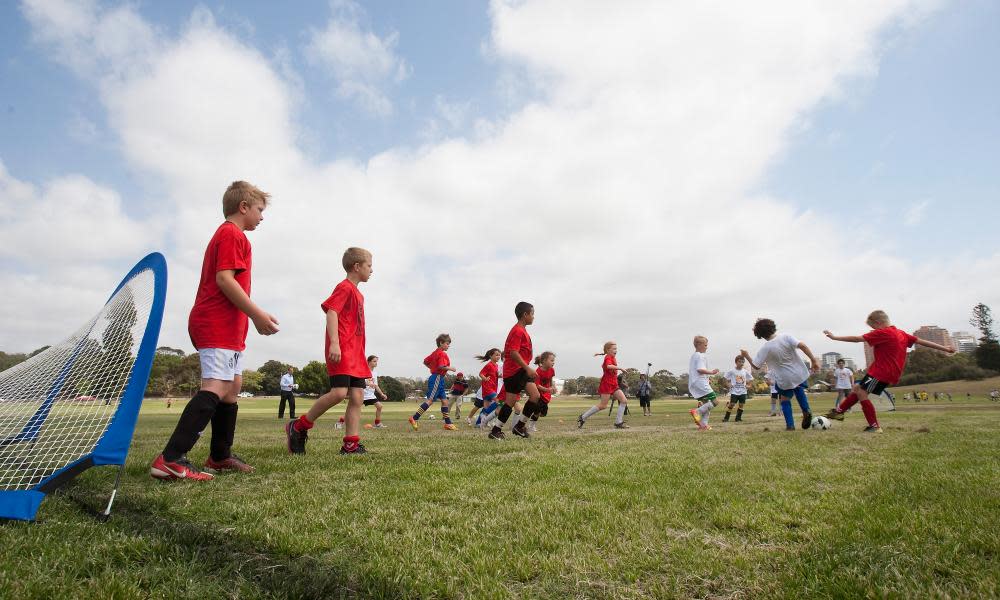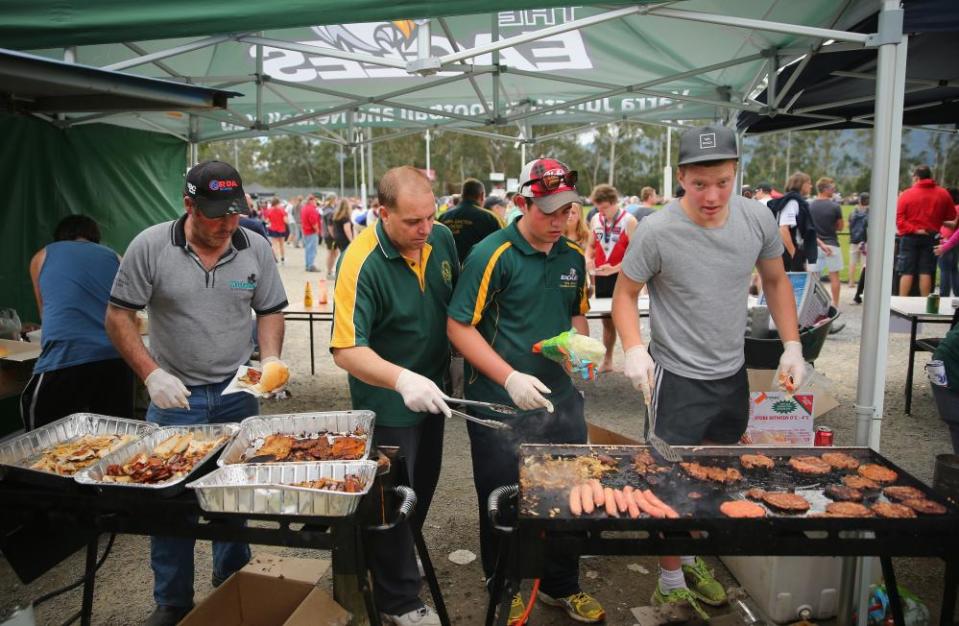Clubs run on the smell of an oily rag face tough times as coronavirus hits community sport

Read the daily sport headlines – or at least those that exist in this time of competitive dormancy – and one could be excused for thinking the only athletes affected by the coronavirus-induced halt to activity are professionals.
What of those, though, who play sport not for a living but for recreation? What of the children of Australia who populate suburban mini-fields each weekend to kick a ball with their friends? These are the millions of participants who not only form the grassroots sport collective but in many cases, as people who pay to play, are a vital source of funding for the upper echelon to which they aspire.
Related: Pause due to Covid-19 gives AFL a chance to build a more agile and inclusive game | Rana Hussein
At the big end of town, governing bodies are busying themselves with the big issues: salvaging seasons, player payments, cost-cutting and more. At the other end of the spectrum, however, the lifeblood of Australian sport is suffering in silence, waiting for word from above and fearful of times to come. Government, meanwhile, has more on its mind than sport.
“I know there’s a lot going on out there and I doubt community sport is a priority at the moment,” Matthew Winters, president of Virginia United Football Club in Brisbane’s north, tells Guardian Australia. “Our minister for sport in Queensland is also the minister for housing. His focus, and nor should it be, won’t be on community sport at this time.”
Community sport clubs around the nation are run on shoestring budgets and facilitated almost exclusively by volunteers. Their funding model revolves around the key driver of player registrations, propped up programs, fundraising events and the ubiquitous canteen. But a time of no sport also means a time of no money.
“The annual registration fees aren’t enough to cover the costs that we incur,” Winters says. “We are very reliant on school camps and canteen. Sausage sizzles make a fantastic amount of money which is essential for a club to operate. We’re just not making that money now. But we still have ongoing costs. We still have to maintain the fields. We have to pay water bills.”
With winter sports in abeyance but facing the possibility of total wipeout in 2020, the issue of registrations has become problematic. Most players are already paid up, presenting clubs with the dilemma of what to do in the event of a drastically reduced season or one that does not start at all. The governance and distribution of these registrations differ from sport to sport but in football everyone gets, and needs, a piece of the pie.

“If all competitions were cancelled I believe a full refund would be disastrous for St George FA, Football NSW and Football Federation Australia, unless they received emergency funding from the federal government,” says Jeremy Babb, president of All Saints Oatley West Football Club in Sydney’s south.
“Parents and members are going to ask for their registration money back. This will mean teams fold and larger amounts of people subsequently ask for refunds. This in turn will impact the associations, who all rely on registration income to supplement their bottom line and give them the ability to operate. Without members and children playing sport, the associations can’t survive.
“At this stage we are following the government’s directions down to Football NSW and looking at a shorter season. If it goes past the current May start date it may be a cancelled season with no games played, which would indicate all members of all associations should get a full refund.”
Last week, clubs across the state refused to forward registration fees to Football NSW after its 24 regional associations were invoiced by the governing body. Bill Owen, the association subcommittee chair, says: “How does taking money off mum and dad and giving them nothing for it get those people to come back next year? By charging them something and not giving them anything you are just adding to their financial stress. I think that’s pretty awful.”
It’s a common plight, with Winters experiencing the same grievance in Queensland. “We’re affiliated with Football Brisbane and they’re still issuing invoices to us,” he says. “If the authorities have suspended the season, why haven’t these invoices been suspended? We’re getting emails from people saying me and my partner just lost our jobs. How can you not do a refund there?”
Related: Australia’s future rugby landscape to be shaped by pay cut talks | Bret Harris
Community sport will survive the coronavirus pandemic. But in what form and in what health? The prospect of some clubs folding is a real one. “If there isn’t any help, and I get there are other priorities, lots of clubs will go down,” Winters says. “If clubs are forced to refund their members now after the costs they’ve incurred, there won’t be any money left to pay for upcoming costs and a large number of clubs will have no choice other than to close their doors for good. If clubs do go under, how do you get them going again?”
Just how much help community clubs need to survive this crisis will vary. Adding to the anxiety of those at the coalface is a lack of certainty from where, if at all, assistance will come. “No money comes down from the FFA,” Winters says. “They’re not talking about grassroots football; they’re talking about their own survival and seem to be focusing at a bigger level and not really grassroots.”
In time, these discussions will come and the outlook for community clubs will become clearer. For now, though, grassroots sport is in the same boat as the rest of us. For now, all we have is hope. “I think the strong community spirit will ultimately put grassroots sport back on the playing fields,” Babb says. “And I hope we will come out the other side as a more committed and involved sporting base with little or no damage to our games.”
Football Federation Australia was approached for comment

 Yahoo News
Yahoo News 
